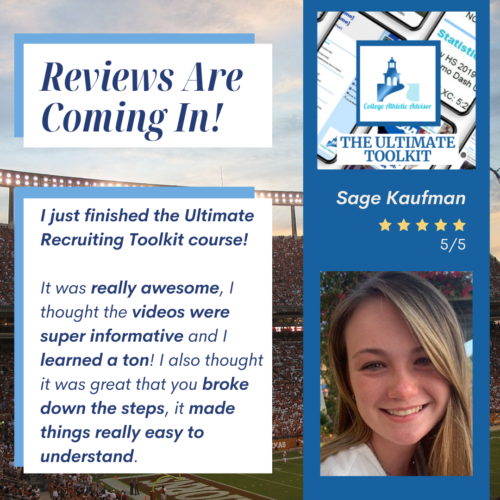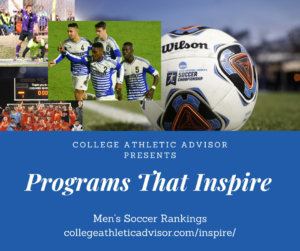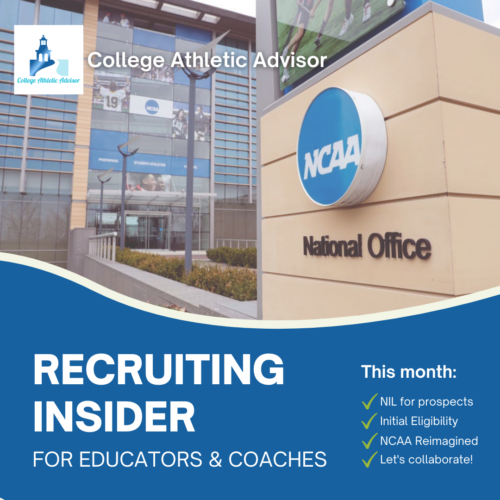Added Time: Our Monthly College Search Newsletter
December 2023: Get The Facts!
Welcome back to Added Time, back from hiatus and hopefully better than ever! I want to take a moment and thank all our clients and colleagues for their encouragement, trust, and enthusiasm. This business would not exist without the students, families, and organizations we serve! I want to take a moment to particularly thank the Seattle Mariners Hometown 9 program for entrusting College Athletic Advisor to be their college search expert training Mariners’ mentors and working directly with students and families!
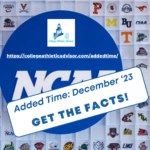 Recently, I attended a conference where a supposed “athletic recruiting expert” made several assertions that underscored how significant misinformation has become widespread – and how critical it is to set the record straight, so students understand the opportunities and challenges ahead of them! Let’s get to it!
Recently, I attended a conference where a supposed “athletic recruiting expert” made several assertions that underscored how significant misinformation has become widespread – and how critical it is to set the record straight, so students understand the opportunities and challenges ahead of them! Let’s get to it!
One area where overblown/overheated discussion abounds is the difference in commitment between the divisions. You can enlarge the graphic here to see how NCAA regulations and practice time vary between divisions in fall sports. I believe this information provides a far better snapshot of the differences between different affiliations than vague discussions about “commitment.” 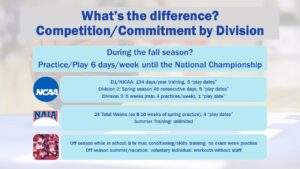 The truth is that in season, a student-athlete is pretty much a student-athlete: practice/games 6 days a week, travel days, competing for a conference title/national playoff at the end of the year. Out of season, student-athletes have to train, or they will not reach their potential, but the different divisions have significant differences in formal training opportunities with coaches supervising/setting schedules. It is not necessarily more training time, but the mix between training environments that are student or coach driven.
The truth is that in season, a student-athlete is pretty much a student-athlete: practice/games 6 days a week, travel days, competing for a conference title/national playoff at the end of the year. Out of season, student-athletes have to train, or they will not reach their potential, but the different divisions have significant differences in formal training opportunities with coaches supervising/setting schedules. It is not necessarily more training time, but the mix between training environments that are student or coach driven.
Another area where I have heard professional counselors/advisors repeat misinformation relates to student-athlete access to majors. I recently heard an educational consultant tell an entire conference hall of people that “student-athletes in Division 1 can not major in engineering.” I’m sure Purdue, Georgia Tech, Lehigh and many others would have been pretty surprised to hear that. If a college counselor, coach or anyone else you know asserts something like this, you should probably significantly discount ALL information coming from them. There are student-athletes competing in Division 1 (including FBS football) who are studying whatever demanding academic program you can think of. There are also student-athletes who do not choose this path. There are coaches (in every division) who discourage students from pursuing demanding academic majors while they compete. It is YOUR job in the recruiting process to make sure that your academic and athletic aspirations align with the coach you are going to play for. Most coaches are very up front about their expectations, if their expectations do not align with yours that program is not a good fit. If there is a “bait and switch” type situation, it is time to have a conversation with an administrator and to hit the transfer portal.
Some advisors also insist that student-athletes need time-consuming volunteer/service projects unrelated to sport as part of their college profile as well. The reality is that students generally do meaningful service as part of their graduation requirements for high school, but ALSO, it is NOT necessary or beneficial to take on some random volunteer project to impress colleges. The reality is that as a student-athlete you will have many seamless opportunities to serve your community within your athletic program! Coaching youth or supporting their participation through service as an official, fundraiser, event volunteer or in some other way demonstrates your commitment to building community and giving back. Colleges generally recognize this as more valuable than “pay to play” trips to build wells in South America divorced from your overall interests.
Finally, it is not a great idea to check in with your high school or youth coach to assess your fit in college. At every school there is a person being paid to make that call. You should email them. If they blow you off, that is an answer. But with 17,000 high school athletic programs, there is NO benefit to not reaching out and asking. Not sure who to ask? Give me a call!
As always, if you are looking for the individualized or institutional consulting help that puts you ahead of your peers, check out our services here! You can make an initial appointment through the link on our homepage! School administrators and counselors access our free resources, appointments and programs for school collaboration here.
For more information, contact Dave Morris, College Counselor & CEO, College Athletic Advisor, [email protected] or phone: (719) 248-7994
©2024 All Rights Reserved
The Ultimate Toolkit
online course guides you to create the keys to a successful college search!
You'll get
- an academic/athletic resume
- impactful highlight video & a video channel that allows coaches to evaluate you in depth
- an introductory email that gets opened and gives you the opportunity to connect with college coaches
Download Our Recruiting Resources Page Here
I would like deeper insights into all this... can we talk?
Of course!! Schedule an initial consult, email; or call (719) 248-7994 and let's discuss how we can collaborate!

